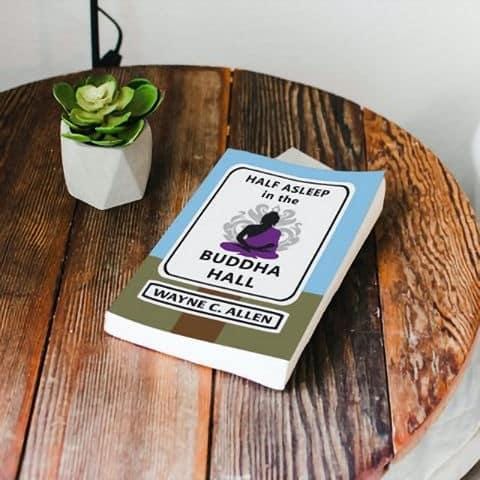Infinite Choice — blaming, holding on to grudges, all keep us stuck. Letting go opens the door to choice

Looking for more on this topic?
Check out my book,
Half Asleep in the Buddha Hall.
My “Eastern” book takes you by the hand and helps you to find peace of mind.
Half Asleep in the Buddha Hall is a Zen-based guide to living life fully and deeply.
(Here’s a direct Amazon link)
Purchase digital versions (Apple, Nook, Kobo, etc.) from this page
Our minds are slippery things. We have the quite necessary ability to link or chain events together — it’s how we know, for example, not step in front of a speeding bus, even though our only close call was with a speeding car.
The problem comes when we link together things that lead us in difficult directions.
Here are a few examples from long ago:
Case 1: A client experienced a depression. After some months, it lifted. She spent months walking on tiptoes, lest she fall back in. She assumed that there was only one way to deal with depression. Her assumption is that she can only survive (she hopes) a depression… the idea of exploring it for its lessons is scary. She though there was no choice other than what she did the first time.
Case 2: A couple with adult children (the “kids” were in their early 30s) were fighting over how to get them to behave differently. Except that mom wants one thing, the dad another.
The kids had their own lives and did what they want.
This was not acceptable to either parent. They both told me, “They’ve never listened!”
They wanted me to make the kids listen — and the kids were not there.
When not being angry about the kids not listening, they yelled at each other about who is right. They were caught in repeating the past.
Case 3: A couple had been married 12 years. They weren’t talking much, nor doing much together. This, they told me, was because,
a) his dad died 2 years earlier,
b) her mom died 1.5 years earlier, and
c) she had surgery 6 months ago.
They live in the past, with regret.
I always asked what each client wanted from therapy. Invariably, I was told that the client wanted to have a successful relationship, career, or family — to be happy — to have the drama stop.
If that’s what they want, how come they’re so successful at not getting what they say they want? How come it’s the same drama, again and again?
It’s like horses and blinders. You put blinders on, and all you can see is what you are looking at.
The odd thing is that “everything else” exists, and it’s all “right there.” All possibilities exist simultaneously. It’s called infinite choice. Just because you choose not to notice does not make infinite choice go away. The only issues is this: change takes effort.
Our world is rapidly circling the drain, and it’s because people are happy being victims and blaming others
Many moons ago, I wrote a free booklet called, Building a Responsible Relationship. In it I uses the concept of the dirty clothes drawer. I repeated this analogy in Half Asleep in the Buddha Hall
The analogy: This dirty clothes drawer is where the stuck stuff is kept. It’s filled with failures, accusations, and tons of stuff that has never worked.
For many people, this is an important drawer When bored, they sit alone in their dimly lit rooms, and fondle their dirty clothes. Each in turn is removed and examined. Each triggers a story of “poor me, hard done by.”
Each story, each drama, is magnified — each is made grander — more significant — while adding a layer of “I have no choice!”
Entire lives are wasted, as they sit in dim rooms, fondling smelly clothes.
Leaving the dirty clothes pile takes effort
The person states she wants a good relationship. However, she yells, the good relationship is not going to happen until her partner has paid in full for every sin, real or imagined, that she perceives her partner has committed. Or, things are not going to change until the system (he University, the job, the kids, the depression)) changes.
Nothing is clean, fresh, new.
Each thing that happens is added to the contents of the dirty clothes drawer, whether it has anything to do with the contents or not.
And just as people are capable of coming up with the oddest combinations of clothes from their closets, the combinations of “present event” and past “dirty clothes” are breathtaking. As you’d expect, given that the drawer is filled with 10-year-old funky memories.

Looking for more on this topic?
Check out my book,
Half Asleep in the Buddha Hall.
My “Eastern” book takes you by the hand and helps you to find peace of mind.
Half Asleep in the Buddha Hall is a Zen-based guide to living life fully and deeply.
(Here’s a direct Amazon link)
Purchase digital versions (Apple, Nook, Kobo, etc.) from this page
I push people to be honest
I’d much rather hear, “I’ve been tucking this stuff away for years, and hell will freeze over before I let anyone off the hook for any of it!”
Or, “This hurts like hell, but I’m going to choose a different behaviour, starting right now!
That’s the one that makes the difference, when coupled with follow through.
All of this requires really letting go of what doesn’t work. Letting everyone else off the hook, and choosing how to live is not a one time for all thing. You can’t go back to what didn’t work and expect different results. You can’t give up blaming, except for this time.
Choosing differently (having infinite choice) means every time
Some people tell me this is too simple. That the contents of the drawer need examination — there needs to be blame assigned, and they want me to help.
Let me say this plainly: I’m not in the least bit interested in why something is in the drawer. I’m not interested in what excuse you use for keeping it there. I don’t need a long explanation for why you dig it out and try to throw it at someone.
The answer, to me, is simple. Stop blaming others (or yourself) for your misery. Let go of everything you insult yourself over. Begin to exercise infinite choice.
During my 32 years of private practice, I watched some (a few…) people hear me spell out their game, and then immediately and simply choose to stop doing whatever they were doing, without making a decades long problem out of it.
As an amusing side note, I counselled several therapists over the years, and none of them pulled this off. OK for their clients, but…
Everyone can get over himself or herself, right now. No exceptions. The only question is, will you?
To say, “Well, maybe other people can, but I can’t,” is to say, “I won’t, because then I’d have to give up being special. I’ve earned this pain, and I’m going to keep it.”
That, emphatically, is not the same as “I can’t.”
Which begs my question, “If you want a contented life, why do you keep doing the very things that screw it up?” Why not be honest and say, as I noted above, “I’ve been tucking this crap away for years, and hell will freeze over before I let others off the hook for any of it!”
Or, you could get over yourself!
With honesty, there is choice. I’m done making lousy choices. I’m going to explore (both alone and with a therapist) other ways of being and doing, let go of blaming, and find a more elegant way of being.”
This, I believe, is the far better choice. The infinite choice of infinite choice.





